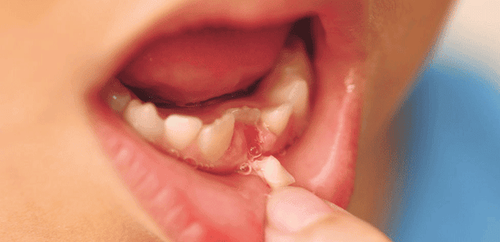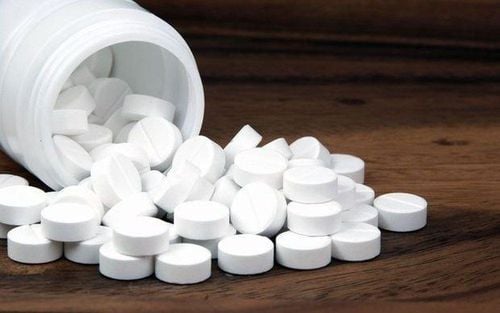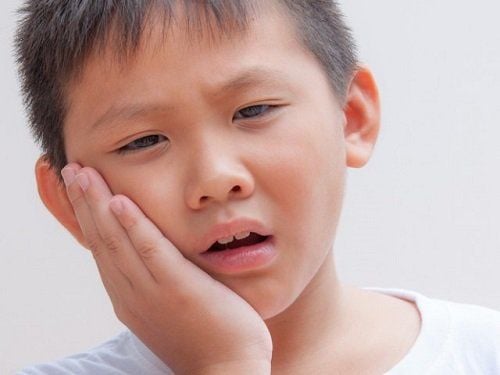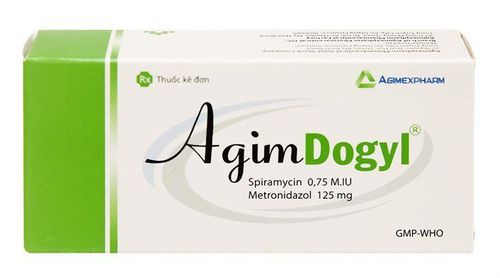This is an automatically translated article.
Gingivitis is a very common disease in children. This is a bacterial infection that causes inflammation of the gums around the teeth and bleeding gums.
1. What is gingivitis?
Gingivitis is an inflammation of the gums that leads to pain in the mouth. This condition is caused by a virus and is common in children. Symptoms can be mild or severe. Although you may feel confused when you see sores in your child's mouth, they often feel pain. However, the condition is usually nothing serious.
Most people carry viruses that can cause this condition. In fact, your child's episode of gingivitis may be the first when he or she is infected with the herpes simplex virus type 1 (HSV-1), the virus most people get during childhood and carry with them throughout life. The early stages of inflammation often go unnoticed, however, often it occurs in the form of gingivitis. (HSV-1 can also cause herpes.)
Gingivitis can also be caused by the coxsackie virus, the culprit behind hand, foot and mouth disease and herpangina. Maybe your child has gingivitis, 1 in 10 common childhood diseases. Due to the immature immune system of children, children are susceptible to gingivitis, weak baby teeth are favorable factors for bacteria causing gingivitis to attack children. Children's teeth can loosen, fall out and cause serious oral diseases such as gingivitis and gingivitis if gingivitis in children is not treated early.
Gingivitis progresses through many different stages. Bacterial toxins in tartar secreted cause irritation to the gums and bacteria colonize around the teeth, making the gums red and swollen, causing gingivitis in children.
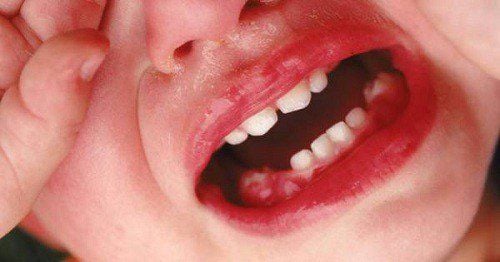
Viêm nướu răng là tình trạng nướu bị viêm nhiễm dẫn đến đau miệng.
Plaque formed on the teeth is the direct cause of gingivitis. This is a soft, colorless, bacteria-containing film that forms on the surface of teeth and gums. The condition of gingivitis becomes more and more serious the longer the plaque bacteria survive.
One of the main causes of gingivitis in children is poor oral hygiene, which leads to the accumulation of dirt and bacteria around the teeth.
2. Signs of gingivitis in children?
Children with gingivitis often have small sores (about 1 to 5mm in diameter), gray or yellowish in the middle, and red around the edges. The severity and location of the sores depend on which virus is causing the gingivitis.
Your child may have sores on the gums, on the inside of the cheeks, at the back of the mouth, or on the tonsils, tongue, or soft palate. Your baby's gums can become inflamed and bleed easily.
Because sores can be very painful, children can easily become irritable, drool more than usual, and do not want to eat or drink much. The child may also have bad breath and a high fever (up to 40 degrees Celsius), and the lymph nodes on either side of the neck may be swollen and tender. If you notice these symptoms in your child, call the specialist.
Note: In some cases, herpes gingivitis can spread to the eye and infect the cornea. Herpes simplex keratitis, known as an infection, can cause permanent eye damage. Take your child to the doctor right away if he has gingivitis and you notice that his eyes are watery and red or he is sensitive to light - both of which are early symptoms of herpes simplex keratitis.
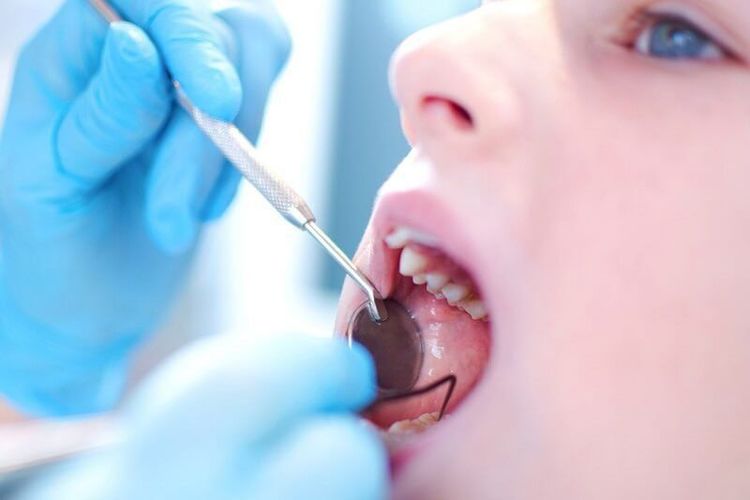
Viêm nướu răng là tình trạng nướu bị viêm nhiễm dẫn đến đau miệng.
3. How to treat gingivitis?
Gingivitis is a viral infection, antibiotics will have no effect in treating it. Sores in your baby's mouth should clear up in a week or two. Here are some things you can do to help make your child more comfortable and keep them healthy with gingivitis:
Infant acetaminophen or ibuprofen can help relieve pain and reduce fever. (If your baby is under 3 months old, check with your doctor before giving him any pain relievers. And never give aspirin to a child under 20. It can cause a rare but dangerous illness. A more serious condition called Reye's syndrome is when a child won't eat even with the help of these over-the-counter pain relievers, the doctor may prescribe stronger pain relievers. While your baby may not want to drink because of difficulty swallowing, it is extremely important that he or she drink enough water. Make sure your baby is getting plenty of breast milk or formula. If your baby is 4 months old, you can also try giving nonacidic, non-carbonated drinks like water or diluted apple juice. Dehydration can happen very quickly in infants and young children - this is the main complication to watch out for if your child has gingivitis. Call the doctor if your child has not urinated in 6 hours or has loose stools, or if your child has any other signs of dehydration. If your child eats solid foods, it is best to give them foods of moderate consistency, such as: baby food, mashed potatoes, yogurt, apple sauce and other soft foods, Other flavors do not require chewing. However, do not force your child to eat if his mouth is sore.
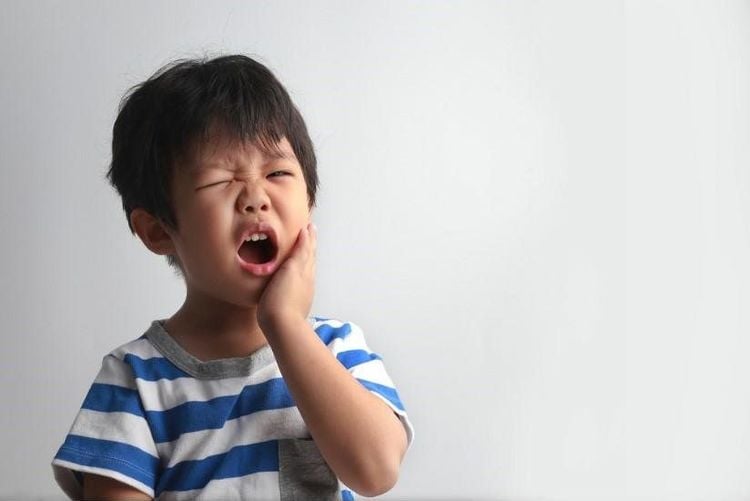
Vết loét do viêm nướu trong miệng của bé sẽ khỏi sau một hoặc hai tuần
4. Can gingivitis be prevented?
Because so many adults and children carry the herpes virus and because they can transmit the virus (and coxsackie virus) even without symptoms, there is practically no way to prevent it. prevent gingivitis. However, you can try to keep people with active herpes infections or any other mouth sores from kissing, sharing food, or playing with your child. (Including you).
If your child's sores are caused by the herpes virus, the virus will stay in the child's body for life. The first period of gingivitis a child gets is the most severe and rarely happens often.
To ease the swelling and pain, you should take your child to a dental specialist to be examined, prescribed oral medication, gum medicine to ease the swelling and pain. Your baby won't fuss and eat and drink normally once the gingivitis is gone.
Need to clean gums, tongue, teeth from a young age with soft gauze with tongue and mouth drops to protect children's oral health. In the period 1 - 2 years old, you help your baby brush his teeth with a brush with diluted salt water. For children from 3 years old and up, they can brush their own teeth with baby toothpaste. You should take your child to the dentist regularly 2-3 times a year to check for dental problems.
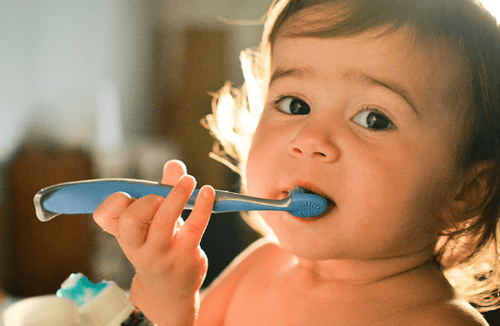
Ba mẹ nên hình thành thói quen đánh răng ở trẻ
When a child shows abnormal signs of health, parents can take the child to Vinmec Health system for timely examination and treatment.
In addition, in order to prevent diseases that young children often get, parents should pay attention to nutrition to improve children's resistance. At the same time, add supporting foods containing lysine, essential micro-minerals and vitamins such as zinc, chromium, selenium, B vitamins,... snacks and less digestive problems.
Parents can learn more:
Why do you need to supplement Lysine for your baby?
The role of zinc - Guidelines for reasonable zinc supplementation
Please visit the website Vinmec.com regularly and update useful information to take care of your baby and family.
Reference source: Babycenter.com




